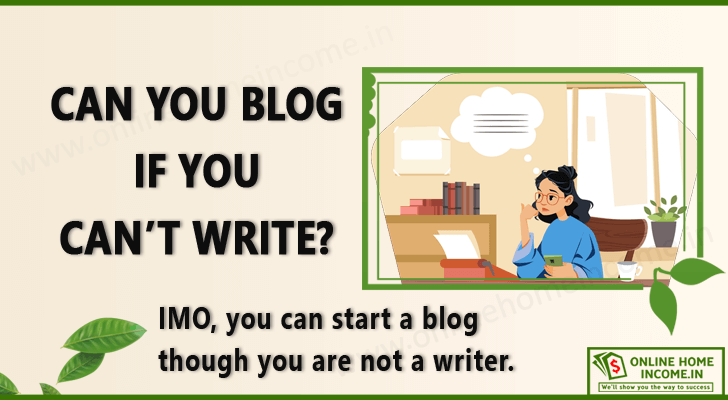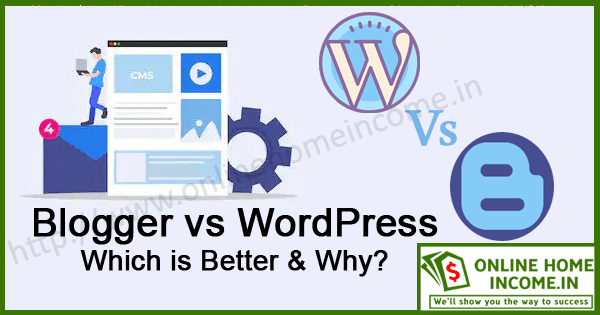Discover the methods to overcome the fear of writing blog posts. A student asked me – Can you blog if you can’t write or do not know what to write? I have personally shared a few tips to overcome the fear that holds you from starting a blog.
After seeing the overwhelming response to the blog, did you plan to start blogging today?
But, you worry about your writing skill as you feel writing is difficult. In this article, I will tell you if can you blog if you can’t write.
Of course, writing is the foundational blogging skill, but it is not the only required criterion. Writing blog posts is a part of blogging.
Even if you are not good at writing (or) even hate to write — you can start a blog.

⇒ Does $10 a day in your bank will make you happy? If so, here is an exciting opportunity for you to start free.
⇒ All you need is a Smartphone with an Internet connection. | Join today!
Many people think blogging is difficult because they feel writing is not their cup of tea. Do not worry about it, as you can use several strategies to create engaging content for your blog.
Other sets of people say they cannot write blogs because they don’t have time. They fear themselves saying that they do not know what to write.
Just be yourself and share your ideas organically. You can also use different images and videos to convey your idea.
Don’t let the misconception of, you are not a writer hold you back. With the right approach, you can create compelling content for your blog even if you are not a skilled writer.
So what are you looking for? Come, let us look further into the article!
Do I Want to be a Good Writer to Become a Blogger?
Yes, being a good writer is important, but it is not the only skill needed to become a blogger. Many other elements go hand in hand to grow your blog on a large scale.
— SEO is necessary to grow your blog organically by ranking for the keywords. Organic traffic is always free. Hence bloggers hunt for acquiring a top position in organic results.
— Branding and marketing are mandatory for promoting your blog and creating an audience group. It includes social media promotion, email marketing, and a strong brand identity to attract readers.
You want to manage your time for blogging consistently and dedicatedly. Plan your content creation and marketing strategies prior.
Apart from writing, get industry and subject knowledge to establish trust and authority in the niche.
Try to stay updated with the latest trends, news, and developments in your industry to provide valuable content to your readers.
While being a good writer is important, there are ways to blog, even if you struggle with writing.
- You can use tools like grammar and spell checkers, hire freelance writers, or focus more on visual content, like videos and images.
Hence, successful blogging combines various skills like content creation, networking, SEO, etc.
You can be a good writer and start a blog with the right combination of skills and effort.
So, Can You Blog If You Can’t Write
Yes, you can start a blog though you are not a good writer.
Below are the common questions that may run into your mind.
- How to blog if you can’t write?
- I don’t have time to write blog posts – am I eligible to start a blogging business?
You can start blogging even if you don’t know what to write. If you have other skills, you can simply hire a writer.
Blogging is a fantastic option to share your thoughts, experiences, and ideas with the world.
And, it is not necessary to learn content writing skills earlier before starting a successful blog.
Even, if you feel less confident in your writing, let me help you overcome the obstacle.
- Firstly, brainstorm your ideas by creating a list of topics you are passionate about or have experience with.
- Once you have a list, short-list it down to a few topics you are most excited about and feel confident discussing.
- Research on the Internet and read other blogs, journals, and research papers. Doing so will help you gain more ideas and information to write a blog post.
By following these tips, you can be a blogger or start a blog even if you don’t know to write. Now we will see how you want to prepare yourself to become a blogger.
1. Prepare Your Mindset for Success
Before you dive into blogging, it is essential to set a strong mindset that sets you up for success.
Having the right mindset can make a huge difference in your productivity, motivation, and overall satisfaction with your work.
One key aspect of a strong mindset is having a positive attitude.
- Instead of focusing on the challenges or obstacles ahead, try to adopt a “you can do it” attitude and believe in your abilities.
For example, when starting a new blog, you might face challenges like writer’s block, technical issues, or difficulties growing your audience.
But with a positive mindset, you can view these challenges as opportunities to learn, improve, and overcome.
Another primary aspect of the right mindset is being strong.
- Blogging requires consistency and perseverance. There will be times when you may feel discouraged or face setbacks.
Sometimes you think blogging isn’t working for you, and blogging is not a good career.
Learn to develop a strong mindset to help you bounce back and stay committed to your goals.
For instance, if your blog post does not receive the expected engagement – instead of giving up, you can learn from the experience, make the necessary adjustments, and keep moving forward.
Thus, a strong mindset is essential for successful blogging.
Remember, with the right mindset – you can overcome obstacles, stay motivated, and achieve your blogging goals!
2. Set Writing Goals for Your Blog
Goal setting is an important criterion – when you plan to start this blogging business.
It helps you stay focused and disciplined and makes sure that you are making progress toward your desired outcomes.
- Setting weekly goals can be a great way to stay on track.
For example, you could set a goal to publish two blog posts per week or to engage with your readers on social media for a certain amount of time each day.
Read the important activities to do after you publish a blog post.
Setting goals keeps you responsible and helps you consistently produce content. You must read this article on how often you should blog.
- Monthly goals are also helpful for longer-term planning.
You could set a goal to increase your blog traffic by a certain percentage or to collaborate with a fellow blogger on a guest post.
Monthly goals help you stay focused and make you work towards something always.
- Lastly, yearly goals can help you visualize the bigger picture.
You could set a goal to monetize your blog, launch a product or service, or reach a certain number of subscribers.
These goals give you a sense of direction and purpose for the entire year.
Remember, goal setting is about finding what works best for you and your blog.
It is necessary to make your goals realistic and achievable, review regularly, and make changes as needed.
3. Create a Habit of Blogging Even if You Can’t Write
Blogging is a professional business. You must turn your routine activities into habits.
Developing blogging habits helps you improve your skills, especially in writing.
I always ask my followers and bloggers to create a habit of writing 1000 words a day.
When your routine turns into a habit, you can come out of the fear of starting a blog if you can’t write.
By setting up a good space and routine for writing, writers can ensure that they have the optimal conditions for their creative process to thrive.
Firstly, set up a dedicated writing space. It can be a quiet corner in a room, a cozy nook in a coffee shop, or a private office.
- For example, Monica, an aspiring novelist, converted a spare room in her house into her writing space.
- She set up a writing desk facing a window with natural light, adorned the walls with motivational quotes, and decorated the space with plants and artwork that inspired her.
- Having a dedicated writing space helps her to immerse herself in her writing and get into the flow state more easily.
The second thing is to set a specific time daily to write content for your blog or social media.
- I spend every day from 05.30 am to 07.00 am IST writing content. Also, I spend one hour at night time.
- It is important to choose a time when you feel most productive and creative.
Creating a proper writing environment and infrastructure is essential for establishing a daily writing habit.
By setting up these elements, writers can make writing a daily ritual and consistently produce high-quality content.

4. Put Your Blog Writing into Action
Many of you have that creative itch but struggle to put it into action.
Do not worry, my friend, because I am here to help you overcome those barriers and get your words out into the world!
One common excuse for not writing or blogging is lack of time. Everyone on this earth has the same 24 hours.
— I become a full-time blogger working in the same 24 hours a day. It is about how we prioritize our time.
Instead of watching TV shows or scrolling through social media, set aside a particular time for writing. It could be just 30 minutes a day or a couple of hours a week.
The key is consistency.
There is no perfect start and no need to worry about it. Remember, everyone starts somewhere.
Do not let perfectionism hold you back. Start writing the blog post today and let the words play. You can always edit and improve later. Embrace your unique voice and perspective.
My student, Name X, always wanted to start a travel blog, but she kept putting it off. She realized that she was making excuses and decided to take action one day.
I told her to spend 30 minutes everyday morning (before she had to go to work) recording her trips.
And I insisted on not worrying about perfection and just letting the thoughts flow.
Soon enough, she shared a collection of interesting stories on her blog. Her authentic voice and passion for travel resonated with readers, and her blog gained a following.
P.S. Please do not ask for her name and her blog URL.
It is the right time to stop procrastinating and start writing! Do not let excuses hold you back from fulfilling your writing and blogging dreams.
5. Keep Yourself Motivated to Blog Without Writing Skills
When I started my blog in 2013, I had no one to motivate or inspire.
But, one strong desire pushed me all through the day.
Nowadays, everyone wants to be motivated always to perform an additional task.
Especially in the blogging industry, most of my students want me to motivate them always in writing blog posts and promoting their blogs.
Practically, you cannot always be motivated by another person. No one will appreciate your writing efforts.
- One effective approach is to set clear goals – establish specific, achievable writing goals that are meaningful to you.
For example, you could aim to complete a certain number of words or pages each day or finish a draft by a specific deadline.
Another helpful strategy is to surround yourself with inspiration.
- Seek out sources of motivation, such as books, articles, or podcasts from your favorite speakers. Use them as reminders of why you love writing.
- Additionally, immerse yourself in environments that spark your creativity, such as coffee shops, parks, or libraries.
Furthermore, find a writing routine that works for you. Some writers thrive on a strict writing routine, while others prefer a more flexible approach.
You come up with your own style and routine and stick to it. Remember, writing is a journey, and it’s okay to face obstacles along the way.
6. Always Think Outside the Box Before Writing Blogs

When it comes to writing, thinking outside the box is crucial for nurturing creativity and producing innovative content.
By going beyond the boundaries of conventional thinking, you can unlock new perspectives, generate fresh ideas, and create unique and compelling content.
For instance, let us consider a research paper on mental health.
- Instead of merely repeating the same facts and findings, an out-of-the-box approach could involve exploring unconventional angles or proposing new solutions.
- It could include delving into lesser-known aspects of the issue, challenging existing archetypes, or incorporating multiple perspectives.
- By pushing the boundaries of traditional research, as a writer, you can engage readers with a thought-provoking and original piece of work.
Again in content writing, thinking outside the box could involve following unconventional storytelling techniques or incorporating unique similarities.
Successful bloggers are the ones who produce content that resonates with their audience’s pain points.
Breaking free from conventional thought patterns and celebrating curiosity and open-mindedness can lead to unexpected and groundbreaking ideas.
It can involve brainstorming without limitations, seeking inspiration from diverse sources, or challenging preconceived notions.
Going beyond the boundaries in research, writing content, and generating ideas can give life to your creativity, making your work stand out and leaving a lasting impact on your readers.
7. Prepare an Article Outline First Before Writing
Still, if you doubt can you blog if you can’t write – here is another solution. When writing an article, creating an outline is a crucial step.
An article outline helps you organize your thoughts and ensure your writing flows smoothly.
It guides you throughout the content-writing process and saves more time thinking of new ideas.
Let me explain this with an example.
Article Title: “The Benefits of Regular Exercise for Mental Health.”
I. Introduction (H1 or Page Title)
— Start with an attention-grabbing statement about the importance of mental health.
— Provide a brief overview of the link between physical exercise and mental health.
— Clearly state the main argument of the article – how regular exercise positively impacts mental health.
II. Body of the Article
— A. Physical Benefits of Exercise (H2)
— B. Psychological Benefits of Exercise (H2)
— C. Social Benefits of Exercise (H2)
III. Conclusion (H3)
End with a compelling call to action, such as encouraging readers to incorporate regular exercise into their lifestyle for better mental health.
Remember to write in an active voice and like a conversation with a friend. It helps to avoid plagiarism and make the article engaging.
Once you have the outline ready, you can start developing the content with your research and materials, following the structure and instructions provided by the article outline.
8. Write a Full Draft without Proofreading
When it comes to blogging, many people underestimate the importance of writing the whole draft without getting caught up in proofreading, editing, and formatting.
But believe me, it can actually save you a lot of time in the long run!
First of all, writing the whole draft without getting stuck by proofreading and editing allows you to unleash your creativity and get all your thoughts down on paper.
It helps you to maintain a flow of ideas without interruptions, which can be incredibly beneficial for your writing process.
Secondly, focusing on covering all the information on the topic, irrespective of its proximity, can lead to a more comprehensive and well-researched article.
By writing the whole draft first, you ensure that you cover all the relevant information and can then go back and fine-tune the details during the editing process.
For example, You are writing a blog post about healthy eating habits.
- It might tempt you to spend more time perfecting the introduction or formatting the headings.
- However, if you focus on writing the whole draft first, you can cover all the key points about healthy eating.
- It includes meal planning, portion control, and nutrient-rich foods without getting too caught up in minor details.
- Writing the whole draft without proofreading and editing initially can be time-consuming.
It allows you to unleash your creativity and cover all the relevant information on the topic. After completing the first draft, fine-tune the details during the editing process.
9. Write like Talking to a Friend
Do you know how some people get anxious and worried about writing blogs? Seriously not rocket science, and there is nothing to fear.
Here is the thing: once you have a clear idea of what you want to talk about and a plan in place, it is smooth sailing from there.
Let me give you an example. Now, you want to write a blog about gardening.
You can start by jotting down the main topics you want to cover, like choosing the right plants, preparing the soil, and watering and fertilizing.
Then, you can jot down a few key points or ideas for each topic. As explained above, do your own research by reading blogs, research papers, online journals, etc.
- After collecting all the information along with the article outline, start writing your first draft.
- Write in simple, plain English that is easy to read. More precisely, write like you are chatting with your friend.
- Easily explain the process from your knowledge and in simple language. Do not dive into the dictionary to express your English proficiency.
Now you know it, you have a well-written blog that is engaging and informative! So, do not stress about writing blogs.
10. Break Paragraphs and Add Bullet Points to Your Content.
Long paragraphs can be overwhelming for readers, especially online.
People tend to lose interest and may even leave your blog if they feel overwhelmed by lengthy paragraphs.
Let me give you an example to illustrate this.
Imagine you are reading a blog post about healthy eating habits. You come across a paragraph that looks like this:
We need to follow a balanced diet in order to maintain good health. And a balanced diet must include fruits, vegetables, whole grains, and healthy fats. During the diet, you should not intake excessive sugar, salt, and processed foods. Another mandatory factor is to stay hydrated all through the day by drinking enough water. Remember to eat mindfully, paying attention to portion sizes and avoiding emotional eating. You can also do some mild exercise for overall well-being. Doing exercise makes your body flexible, enhances blood circulation, and creates a good mood.
Now, let us break it down into smaller paragraphs with bullet points:
We need to follow a balanced diet in order to maintain good health. And a balanced diet must include fruits, vegetables, whole grains, and healthy fats.
During the diet, you should not intake excessive sugar, salt, and processed foods.
Another mandatory factor is to stay hydrated all through the day by drinking enough water.
Remember to eat mindfully, paying attention to portion sizes and avoiding emotional eating.
You can also do some mild exercise for overall well-being.
Doing exercise makes your body flexible, enhances blood circulation, and creates a good mood.
As you can see, breaking the paragraph into smaller paragraphs and using bullet points makes the information more conveyable and easier to read.
It allows readers to connect through the content and grasp the main points quickly, making it feel like a friendly conversation rather than a daunting task.
11. Use Writing Tools When You Can’t Write
When it comes to writing and blogging, using tools can be a game-changer.
- One popular tool is Grammarly, which helps to improve your writing by catching grammar and spelling errors, suggesting better word choices, and providing style suggestions.
It’s like having a virtual editor that polishes your content before you hit the publish button.
- Another great set of tools is note-taking apps like Evernote and Notion.
These writing tools allow you to jot down ideas, create outlines, and organize your research in one place.
They are perfect for capturing inspiration on the go and keeping your writing process streamlined.
Using these tools is necessary because they can help you produce high-quality content.
Writing and blogging tools like Grammarly, Evernote, and Notion are invaluable for improving your content quality, saving time, and streamlining your writing process.
They are like your trusty sidekicks, helping you produce top-notch content.
12. Find a Mentor for Content Writing
Finding the right mentor to help you with content writing will give you the confidence to start a blog if you can’t write.
I completely understand the importance of having a mentor or connecting with subject-matter experts.
Having them in the field of content writing will help you overcome problems arising from hesitation.
Many people hesitate to blog because they feel writing is hard and don’t know what to write.
Let me explain this with an example.
- Imagine you are a budding content writer who is passionate about travel writing.
- However, you feel hesitant and unsure about how to start and improve your writing skills.
- You are not confident in your ability to craft engaging travel articles.
- You struggle to find the right tone and structure.
- To overcome these challenges, you decide to seek guidance from a mentor.
Through social media, you connect with an established travel writer who has years of experience in the field.
This mentor provides you with valuable feedback on your writing, shares tips on crafting compelling travel articles, and helps you understand the nuances of the industry.
They offer practical advice on how to pitch your work to publications, build your portfolio, and establish your brand as a travel writer. With the help of a mentor, you can become a successful writer.
13. Improve your Skills and Knowledge of Writing
Improving writing skills and knowledge can seem overwhelming at first. But with the right approach, it becomes manageable.
One way to grow as a writer is by reading widely and diversely.
- For example, if you typically read fiction, try exploring non-fiction, poetry, or articles on various topics.
- It helps expand your vocabulary, exposes you to different writing styles, and broadens your understanding of the world.
Another effective approach is to practice writing regularly.
- Set aside dedicated time for writing and challenge yourself with different genres or prompts.
- You can also seek feedback from mentors or online writing communities to receive constructive criticism that can help you refine your skills.
For instance, if you want to improve your descriptive writing, you can practice describing everyday objects or scenes in vivid detail.
Remember – the key to improving writing skills and knowledge is consistency and practice.
Embrace challenges, seek feedback, and keep pushing yourself to learn and grow.
14. Delegate Routine Writing Work and Hire Outside Help
If you are not confident about your writing skills but still want to create content for your blog, don’t worry!
You can always delegate the writing task to someone having the expertise you lack.
For example, let us say you have a knack for marketing, negotiation, and design – but struggle with writing.
You can hire a freelance writer or collaborate with a content creator.
Make sure that they can put themselves in your shoes and craft engaging blog posts that align with your brand’s voice and style.
Delegating writing works by hiring a freelance writer can save time and effort.
Not only that, you can start a blog even if are not a good writer. Remember, it’s all about grasping the strengths of others to fill the gaps in your own skillset!
How do you write a blog if you hate writing?
Blogging is about writing on a topic and publishing it consistently for a long time. If you hate writing but still want to start a blog, follow the below tips.
Start writing smaller and break topics into manageable pieces. Write 1000 words minimum daily to practice writing and avoid writer’s block.
Use multimedia like images, videos, or infographics to break the text and make your article more visually appealing.
Do you have to be good at writing to blog?
There is no necessity to be a great writer to start a blog. You can groom your writing skill and enhance content quality with regular writing practice.
The only requirement is to be passionate about the topic and have critical writing skills to connect with your audience.
Does Writing a Blog Hard?
Yes, writing a blog post by you requires some basic skills. It includes topic research skills, writing skills, and topical experience.
Some people enjoy writing a blog, and a few see them as more challenging. But, with proper practice and experience, you can write engaging blog posts over time.
If you are more passionate about the topic, you can see writing a blog post less overwhelming and more achievable.
How do I Start a Blog with No Skills?
You want to follow a few basic procedures before starting a blog with no skills. First, choose the right blogging niche and do research to understand the market trend, demand, and competition.
Then, get a domain name and a shared web hosting following by choosing a WordPress blogging platform. Set up your blog by watching videos on YouTube or hiring a WP developer.
Now, start writing valuable content and promoting your blog.
Conclusion
In conclusion, blogging is indeed technically possible for anyone with internet access and basic writing skills.
This business is reliable and successful only for people with strong desires.
It also requires perseverance to overcome challenges like writer’s block, low traffic, and competition.
If you approach blogging with a half-hearted attitude or lack the motivation to consistently invest time and effort you are likely to struggle and fail.
Many bloggers fail to make money because they fail to create blog posts that attract people.
So, can you blog if you can’t write?
- Yes, you can! Even I does not know the art of blog writing when I started this blog in 2013. I learned the writing process gradually after starting my blog.
Successful bloggers often build a loyal audience and establish themselves as experts in their niche. Even generate income through monetization strategies such as sponsored posts or selling their own products or services.
Writing blog posts is a part of blogging, and it is not everything.
By approaching blogging as a conversation with a friend, being authentic, and creating unique content, you can build a successful blogging business.







